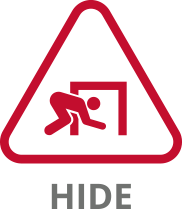
Basic Steps to Respond
Below are some basic steps to respond to more common emergency situations.
Medical Emergency
In the event of a medical emergency, take the following steps:
- Call 9-1-1 immediately.
- Do not move the person unless he or she is in danger.
- Avoid leaving the person except to summon help.
- Render first aid or CPR if you are trained and qualified.
Criminal Activity
If you become aware of criminal activity, take the following steps:
- Call 9-1-1 immediately.
- Do not attempt to apprehend or interfere with a criminal.
- Note the criminal's characteristics: Height, weight, sex, race, age, clothing, weapon (if any), and direction and method of travel.
- If the criminal flees the scene in an automobile, note the license plate, make, model, color, and any other characteristics of the vehicle.
Workplace Violence
If you notice workplace violence, including intimidation, threats, physical attack and property damage, take the following steps:
- Call 9-1-1 immediately and provide a location and description of the assailant or suspicious individual.
- Seek cover behind a locked door.
Fire
If you discover a fire, take the following steps:
- Manually activate the fire alarm.
- Immediately exit the building and close the door(s) behind you.
- Tell others in the area that there is a fire.
- Call 9-1-1 when you have reached safety.
If you are trapped during a fire, take the following steps:
- Wet and place cloth material around and under the door to prevent smoke from entering.
- Close as many doors as possible between you and the fire.
- Be prepared to signal someone outside, but do not break glass until absolutely necessary as smoke may be drawn into the room.
If caught in smoke, take the following steps:
- Drop to the floor and crawl toward an exit.
- Stay as low as possible.
- Take shallow breaths through your nose and use a shirt or towel as a filter.
Flooding
In the event of flooding, take the following steps:
- If it's safe to do so, turn off electrical equipment and secure experiments, vital equipment, records, and hazardous material by moving it to higher ground.
- Call 9-1-1 to report hazardous substances that may contaminate flood waters.
- Do not dump flood water down the storm drain unless doing so is approved by environmental health and safety staff.
Power Outages
In the event of a major, campus-wide outage, the University has emergency generators that restore power to some areas of campus. To report a minor, localized power outage, call Facilities and Operation during business hours at 218-281-8483 or 218-281-8495 after hours. Please note that the campus phone system will NOT work if there is an electrical outage affecting Selvig Hall.
In the event of a major campus-wide outage, take the following steps:
- Remain calm.
- Turn off lights and unplug all electrical equipment, including computers.
- Do not light candles or other flames as they could ignite an explosion.
- If evacuation is required, secure all experiments and shut off research gasses. All chemicals should be stored in their original locations. Fully open fume hoods. If this is not possible or natural ventilation is inadequate, evacuate the laboratory until power is returned.
Chemical, Radioactive or Biological Spill
In the event of a spill, take the following steps:
- During business hours, call Environmental Health and Safety at 218-281-8300. After hours, or if someone is injured, call 9-911.
- Attend to injuries first.
- Warn others nearby of the spill.
- Avoid breathing vapors from the spill.
- Direct potentially contaminated people to stay in a controlled area until they have been cleared of contaminants.
- Isolate and contain the spill. Post or tape off the affected area and establish a controlled entry point to the area.
- Do not allow others into the area, even to retrieve personal belongings.
Active Shooter Response
Active Shooter Response
How to respond to an Active Shooter Situation
An active shooter (person or persons causing great harm to as many people as possible by any means) is a frightening experience causing panic and disorientation throughout the event. Knowing what to do in advance increases your chances of survival and minimizes the horrific and all too often deadly outcome of an active shooter event!
These three words -- RUN, HIDE, FIGHT -- may save your life or the lives of others.

- Have an escape route and plan in mind
- Leave your belongings behind
- Keep your hands visible
- Run to a place of refuge, well beyond the norm

- If running is not possible, hide
- Lock and barricade doors; shut off lights
- Remain silent, yet vigilant
- Avoid huddling together

- Fighting is a last resort, use only when your life is in imminent danger
- Use improvised weapons, i.e. chair, fire extinguisher
- Attempt to incapacitate the active shooter
- There is strength in numbers; work together against the active shooter
Video: Run. Hide. Fight. Surviving an Active Shooter Event.
Please be aware the video contains simulated violence and sounds of gunfire.